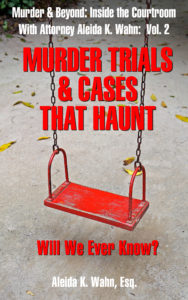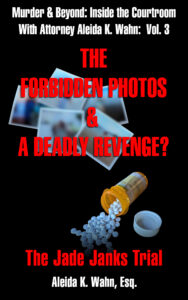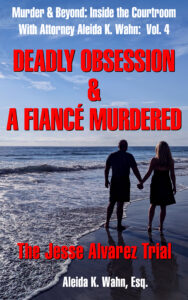
“The last thing Jason Harper saw was not his three precious children, his parents, or his brother. The last thing Jason Harper saw was the barrel of the gun that Julie Harper held.” These emotional words began the closing argument of Deputy District Attorney Keith Watanabe on October 6, 2015, in the murder retrial of Julie Elizabeth Harper. On the morning of August 7, 2012, Julie Harper fatally shot her schoolteacher husband, Jason Harper, in the master bedroom of their Carlsbad home, while their three young children watched cartoons downstairs. Both Julie Harper and Jason Harper were thirty nine.
In her first trial one year ago, Julie Harper testified she was the victim of verbal and sexual abuse by her 6’7″ husband and that she shot him accidentally while defending herself from another sexual attack during a violent argument after she revealed to him for the very first time she had filed for divorce. A jury acquitted her of first degree murder in October of 2014, but could not agree on the lesser charges. A new jury of seven women and five men must now determine whether the shooting death was second degree murder, manslaughter, or whether she acted in justifiable self-defense after enduring years of abuse.

The Prosecution’s Case: Deputy District Attorney Keith Watanabe
Jason Harper Was Trying to Get Away
In a dramatic opening, prosecutor Watanabe pulled a life sized mannequin before the jury with an arrow inserted at the point the bullet entered Jason Harper’s body. He told the jury that the most reliable piece of evidence in the case was “this mortal wound” in Jason Harper’s upper left side, underneath his left arm, which showed that Jason Harper was trying to get away. “Jason Harper turned to get out of the way of fire. Jason Harper wanted to live, but Julie Harper would not let him.” Watanabe said that the forensic evidence showed that Jason Harper was not shot at close range but from a distance, and that the shooter had to be slightly behind him.
The death occurred during an “intense verbal fight” continued Watanabe. Jason Harper had screamed and yelled at Julie Harper many times in the past, but this time Julie was not going to take it as she had had enough contended Watanabe. She chose to pull the trigger and end his life. “But did the verbal abuse, the swearing and yelling justify killing a human being?” asked Watanabe.
Julie Harper Killed Her Husband Intentionally
Julie Harper killed her husband intentionally out of “anger, bitterness and scorn,” argued Watanabe. She was deeply hurt emotionally by Jason Harper, and her dreams of a happy marriage and suburban life had been destroyed. She blamed Jason Harper. “There is a motive. Don’t let the defense tell you there’s not,” said Watanabe. He displayed a beautiful photo of the couple on their wedding day, saying they had started out with hopes and dreams. When they married, Julie Harper didn’t know that she would be verbally abused, and Jason Harper didn’t know that he would end up staring down the barrel of a gun.
The prosecutor then took the jury back to the year before the killing, to the time of “Julie’s deterioration.” Julie Harper was addicted to narcotic drugs claimed Watanabe, which had been prescribed for her autoimmune disease and rheumatoid arthritis she was sleeping most of the day while the children were left unattended. The police found fifty-two prescription pill bottles in the home on the day of Jason Harper’s death. She also spent excessively and became a hoarder, with clothes burgeoning out of the closet and clutter piled everywhere. Jason Harper grew angry and the couple argued frequently. The marriage was falling apart and headed for divorce.
Julie Harper Was Not Afraid
In the week before the killing, Julie Harper was not a woman in fear and her actions showed that she was capable of taking matters into her own hands said Watanabe. She took $9,000 from Jason’s personal account by forging his signature, removed over $11,000 from their daughter’s college fund, placed money in a new safety deposit box, and filed for divorce. “She was not a domestic violence victim without resources or hope,” maintained Watanabe.
On the morning of the shooting, Julie Harper had a “window of safety” to escape so the need to kill her husband was not imminent said Watanabe. An argument initially began over Jason Harper’s computer, and at one point he walked out the front door. “If Julie Harper was so afraid, she could have left at this time,” declared Watanabe. Later Jason Harper returned and went on his computer for thirteen minutes, a time when Julie Harper could have again left the home.
Julie Harper Never Called 911, Embarking Instead on a Day of Deceit
After killing her husband, Julie Harper’s actions were “not what you would do if you killed in self-defense” argued Watanabe. She was not crying, did not try to perform CPR, never called 911, and never sought help from the police at any time during the entire day. Instead she embarked on a “day of deceit” in which she tried to cover up what she had done. Immediately after shooting her husband, she concealed his body, disposed of his keys and wallet, took his cell phone and sent a deceptive message to his family, took the children to La Costa Coffee where she purchased coffee and pastries, and then tried to arrange playdates for them detailed Watanabe.
She later returned to the home where she assembled a “getaway bag” containing $39,000 in cash, passports for her and the children, social security cards, and other financial documents claimed Watanabe. She then moved Jason Harper’s car, deleted his text messages and call history, removed the batteries from his cell phone, turned off her own cell phone, and hid the murder weapon.
Julie Harper Got Rid of the Gun
In disposing of the gun, Julie Harper was suppressing evidence. “If that doesn’t show evidence of guilt, I don’t know what does!” exclaimed Watanabe. Julie Harper was lying about what she did with the gun, and still has the gun or knows where it is today he told the jury. Since Julie Harper was claiming the shooting was accidental, it was essential to have the actual gun to measure the exact trigger pull and to perform distance testing. This was not an accidental shooting stressed Watanabe as Julie Harper was experienced with firearms, and it took effort for her to fire the gun with a ten pound trigger pull.
Julie Harper Was Lying About Being Raped
Attorney Watanabe dismissed Julie Harper’s claim of physical and sexual abuse, stating that Julie Harper was lying. “Julie Harper is asking you to believe that Jason Harper, with no history of violence, was really a secret rapist.” Julie Harper was lying about her notations in her day-timer that “sex” was really a code for “rape.” She never listed rapes in her divorce filing and never made the claim to her family or friends. Watanabe acknowledged that there was verbal abuse, that Jason Harper used profanity in front of the children, and on one occasion he grabbed Julie Harper’s wrist and twisted her arm. “But there was no other domestic violence in this case,” insisted Watanabe. “Julie Harper kept journals in which she documented every minutia of her life but there is not one single mention of abuse in them,” proclaimed Watanabe. The children testified that they had never seen their father hurt their mother.
Julie Harper Is Guilty of Second-Degree Murder Argued Prosecutor
Prosecutor Watanabe closed by saying that Julie Harper was not being raped on the morning of the shooting as she never called 911 and reported that she was being raped, Jason Harper was found with his belt still on, and there was “not a single injury or bruise on her body” at the time she surrendered to the police. He said Julie Harper and Jason Harper were engaged in a verbal argument only, which did not justify using deadly force. He asked the jury to find Julie Harper guilty of second-degree murder by finding either that she intentionally killed her husband, or by finding that she had a conscious disregard for human life by pointing a loaded gun at her husband during a verbal argument.
The Defense’s Case: Criminal Defense Attorney Paul Pfingst
Defense attorney Paul Pfingst countered that Julie Harper was indeed an abused spouse, who had endured years of verbal abuse and sexual attacks, including being raped approximately thirty times. He stressed that Julie Harper had no history of violence and only killed her 6’ 7” husband while defending herself from another sexual attack during a violent argument after she revealed for the very first time that she had filed for divorce. He disputed that Julie Harper shot her husband from behind, stating that the medical examiner testified that the location of the gun and Jason Harper could not be determined by the wound location or bullet path. Jason Harper was shot in his upper left side.
Attorney Pfingst presented two scenarios and asked the jury which one was more plausible: That a mother of three decides one day to get a gun and shoot her husband dead for no reason while the children were watching television, or that the day her husband finds out she has filed for divorce, he attacks her. “She didn’t just turn into an assassin,” he said. Julie Harper had gone to the court to end her abuse, and a divorce filing creates anger in an abuser as it ends his control explained Pfingst.
Julie Harper Was a Victim of Domestic Violence
Julie Harper was a victim of domestic violence, which was an undisputed fact in the case argued Pfingst. She was emotionally, verbally, physically, and sexually abused by her husband, and the abuse was triggered by rages connected to finances. “She has an abusive husband who is demeaning her, treating her like garbage,” said Pfingst. Jason Harper had an explosive temper, was profane and threatening, and even the children said so continued Pfingst. He reminded the jury of the testimony of the two older children, who were six and eight at the time of the shooting, that their mother would lock herself in the bedroom to be safe, and that their father took off the door knobs so that she could no longer lock the door. “This is such a staggering revelation. A neon sign, a warning. I have to run to the bedroom to be safe! Who do you know that has to do this?” thundered Pfingst.
To continue reading about what happened in this riveting and heartbreaking trial, please go to Aleida K. Wahn’s book, Murder Trials We Can’t Forget And Other True Cases. Aleida was there inside the courtroom for every minute, and now shares the extraordinary details of what really happened in these gripping and unforgettable trials. Order your copy today at: https://www.amazon.com/dp/B0B2YLWD1X
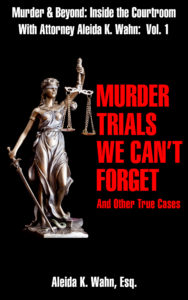
About Aleida K. Wahn, Esq.

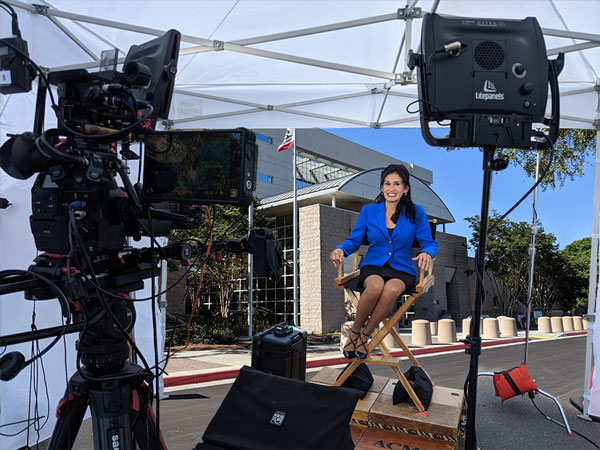
I am an attorney, award-winning true crime writer, and legal analyst of criminal cases. I cover criminal trials and write stories and books about compelling, gripping, and unforgettable cases that impact our world. I take you into the courtroom in high-profile murder trials, rape cases, crimes of passion, cases involving mental illness, deviant behavior, and more. I have a deep passion for true crime, criminal law, and all aspects of the criminal justice system. I have appeared as an expert on true crime shows, including “48 Hours,” “Snapped,” "Peacock TV's Tik Tok Star Murders," and “The Dead Files,” and provided legal analysis on high-profile criminal trials on Court TV, the Law & Crime Trial Network, Fox 5 News, ABC 10 News, and KUSI News. I also create and host shows with the Del Mar Television Producers Group, addressing criminal justice and social issues in recent criminal trials.
I provided my insight and legal analysis on Court TV and the Law & Crime Trial Network of the high-profile trial of former NFL star Kellen Winslow Jr. It was a trial that captured the nation as the heralded ex-football star with fame, fortune, and a famous name stood accused of multiple rapes and other sex crimes involving five women. As the trial delved into shocking facts, complicated legal issues, and unexpected twists and turns, I was there for every minute. After the trial, I wrote a book on the case, going behind the headlines to share the extraordinary details of what happened inside the courtroom. Judging Winslow Jr.: From NFL Star to Serial Rapist? Inside the Shocking Rape Trial of Kellen Boswell Winslow II is now available on Amazon.
I am passionate about telling true crime stories, as these penetrating stories have the power to move us all, while highlighting societal issues which need to be addressed. I have personally seen the human devastation which is present in each trial and believe there is a lesson to be learned in every single case. It is through awareness and examining critical issues society can effect change and even make new laws. To learn more, please visit: https://www.aleidalaw.com.
Read about the gripping and unforgettable trials that I have covered in my latest books:


